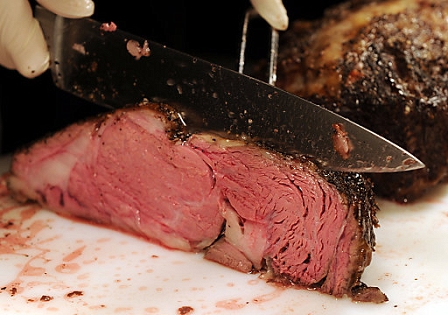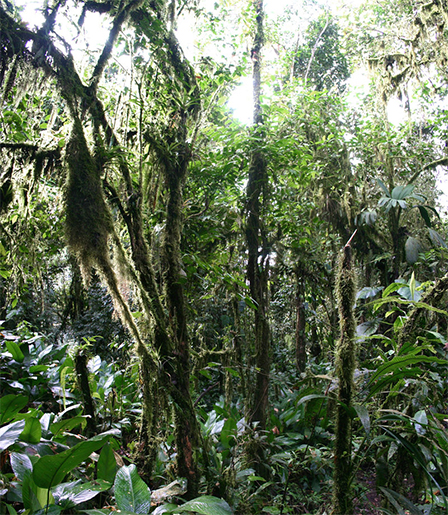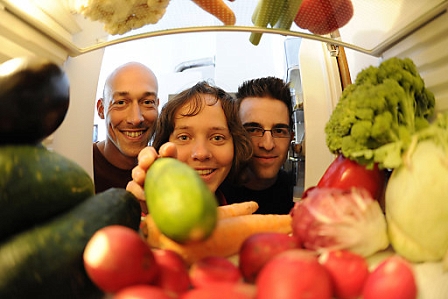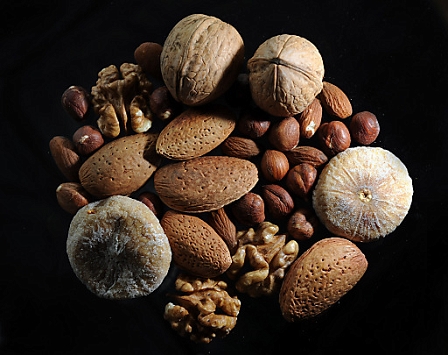Erstellt am: 15. 5. 2015 - 18:51 Uhr
Vegetarians and Trees
A Reality Check Special about the rainforests, meat farming and vegetarianism.
Dieses Element ist nicht mehr verfügbar
Earlier this year environmental campaign group Global 2000 launched a competition to encourage young people to eat less meat and help save the rainforest.
Reality Check Special
Listen to a Reality Check Special about the rainforests, meat farming and vegetarianism:
Saturday, 16th May at 12 noon. And afterwards at seven days on demand.
What's the connection?
Well, Global 2000 (as well as groups such as Greenpeace and the World Wildlife Fund) reports that large swathes of the Amazon rainforest in South America are being cleared not only to farm cattle, but also to cultivate crops like soybeans - which end up being exported as feed for livestock farms in Europe. The production of soymeal has made it possible to raise farm animals (such as chickens, pigs, and cows) on an industrial scale never before seen in human history. A very small proportion of the soybean crop is consumed directly by humans.
Global 2000 is asking us to consider becoming vegetarian, or to try to substantially reduce our meat consumption to once or twice a week to help save the rainforests and the indigenous communities who live there.

APA/dpa-Zentralbild/Jens Kalaene
Stella Haller, Global 2000's rainforest spokeswoman told Reality Check that "each animal that has been fed with soy from Latin America and ends up on our plates means that a piece of precious rainforest has been irretrievably lost”.
Every day an area of rainforest as large as 50,000 football fields is destroyed - to make way for palm oil and sugarcane plantations, timber, cattle grazing and soybean cultivation. Haller said that beef cattle, chickens and pigs in Europe are often fed with imported soy from South America, as the demand for meat is so great that Europe can’t produce enough feed.
Why do we need to save the rainforests?
Tropical forests cover only eight percent of the land-area of the Earth, yet they are home to between 50 and 90 percent of the world's species. Without rainforests continually recycling huge quantities of water, feeding the rivers, lakes and irrigation systems, droughts would become more common, potentially leading to widespread famine and disease.

CC-BY-SA-3.0 - Hjvannes
Deforestation is considered the second major driver of climate change (more than the entire global transport sector), responsible for 18-25% of global annual carbon dioxide emissions.
This is something that concerns Diana Lueger, from the band Zweitfrau. She took part in Global 2000's “Veggies für den Regenwald” campaign and decided to become vegan for the month of March - a change from her normal 'flexitarian', or mostly vegetarian diet. She spent most of the month in LA and said she found it very easy to be vegan in health conscious and sunny California.
Lueger says she ate lots of fresh fruits and vegetables, drank smoothies and felt really healthy as a result. The only thing she really missed was sushi. Coming back to Austria presented more of a challenge – although vegan products are becoming more popular and available, at least in Vienna, it can still be difficult to organise weekly meals and eat out - so for her, being a flexitarian and only eating organic meat and fish in small quantities is the best solution.
Is a vegan diet healthy?
Lierre Keith is an American food activist and environmentalist, who for 20 years was a vegan, but after developing chronic health problems she decided to start eating meat again, which she said radically improved her health. She now argues that we don't need to stop eating animals to save the planet, but that we should boycott modern agricultural practises.

dpa/Uli Deck
She recommends eating organic, pastured, “holistically grazed” animal protein. Unsurprisingly, she’s not very popular with the vegan community. Holistic grazing mimics the herd activity of wild animals, where animals are allowed to graze on perennial wild grasses (rather than annual crops like maize or soy) for strictly controlled periods before rotating them to a new area.
Someone who practises this is Joel Salatin, a leader of the sustainable food movement in the US who owns a farm in Virginia. He argues that holistic grazing restores soil fertility and reduces the use of water, pesticides, and feed grain.
Joel says that if livestock is properly managed then this helps restore the topsoil that has been ruined by millennia of ploughing and planting vegetables, grains and legumes. Meanwhile, new research indicates that holistically grazed grasslands may help prevent global warming because carbon dioxide is captured and stored in the earth, rather than being released into the atmosphere - in a process known as carbon sequestration. This negates the warming effect of the animals’ methane emissions.
The right nutrition
Vienna-based nutritionist Axel Dinse, who works for Urban Health Concept was a vegan for 15 years but said that he developed a serious B12 deficiency as a result. He now follows a largely vegetarian diet, together with small portions of good quality meat a couple of times a week - and in his opinion the best source of protein and iron is grass-fed beef. He is concerned that vegan diets are becoming increasingly popular but that people don’t know how to eat a well-balanced vegan diet can be hard to source as well as expensive.

APA/Barbara Gindl
Axel also says that there is no scientific evidence that a long-term vegan diet is good for you and that for people who lead active, athletic lifestyles and need more protein and iron, a purely vegan diet is probably not the way to go. As far as we know there has never been a civilisation that has not survived by eating some animal products and it’s unlikely that livestock will cease to be farmed or that the majority of people will choose to follow a vegetarian or vegan diet. But if you care about your health and the environment eating a balanced diet which includes plenty of vegetables, fruit and grains and small quantities of good quality animal products seems to be the answer.
Maybe it’s time to try Meat Free Mondays, experiment with flexitarianism, or go back to the days when meat was reserved for special occasions, such as a Sunday roast with family and friends.
Tune in on Saturday 16th May at 12 noon to hear a Reality Check Special about the link between vegetarians and the rainforest.


